The digital landscape is evolving, and with it, the tools we use to create content. One such tool, AI-generated content, has recently taken the spotlight, promising significant boosts in website traffic.
But how effective is it?
A recent case study by Jake Ward, which went viral on TikTok and Twitter, showcased a website’s meteoric rise from zero to 750,000 monthly visitors using AI-generated content.
Intrigued? Let’s dive deeper.
We can count on them to bring new ideas to the table consistently
The Viral Case Study
Jake Ward’s Twitter post revealed that a website, within a span of 12 months, went from zero visitors to generating 750,000 monthly visitors solely from organic search using AI-generated content.
The website, believed to be in the B2B SaaS industry, specifically in finance, used the AI language model transitioning from GPT-3 to GPT-4. The primary tool behind this success? Byword.ai.
The key stats:
- 7,000 total pages generated
- 300K monthly visitors a month after six months
- 750K monthly visitors after 12 months
- 4,000 keywords ranking in positions 1-3
- 13,000 keywords ranking in positions 4-10
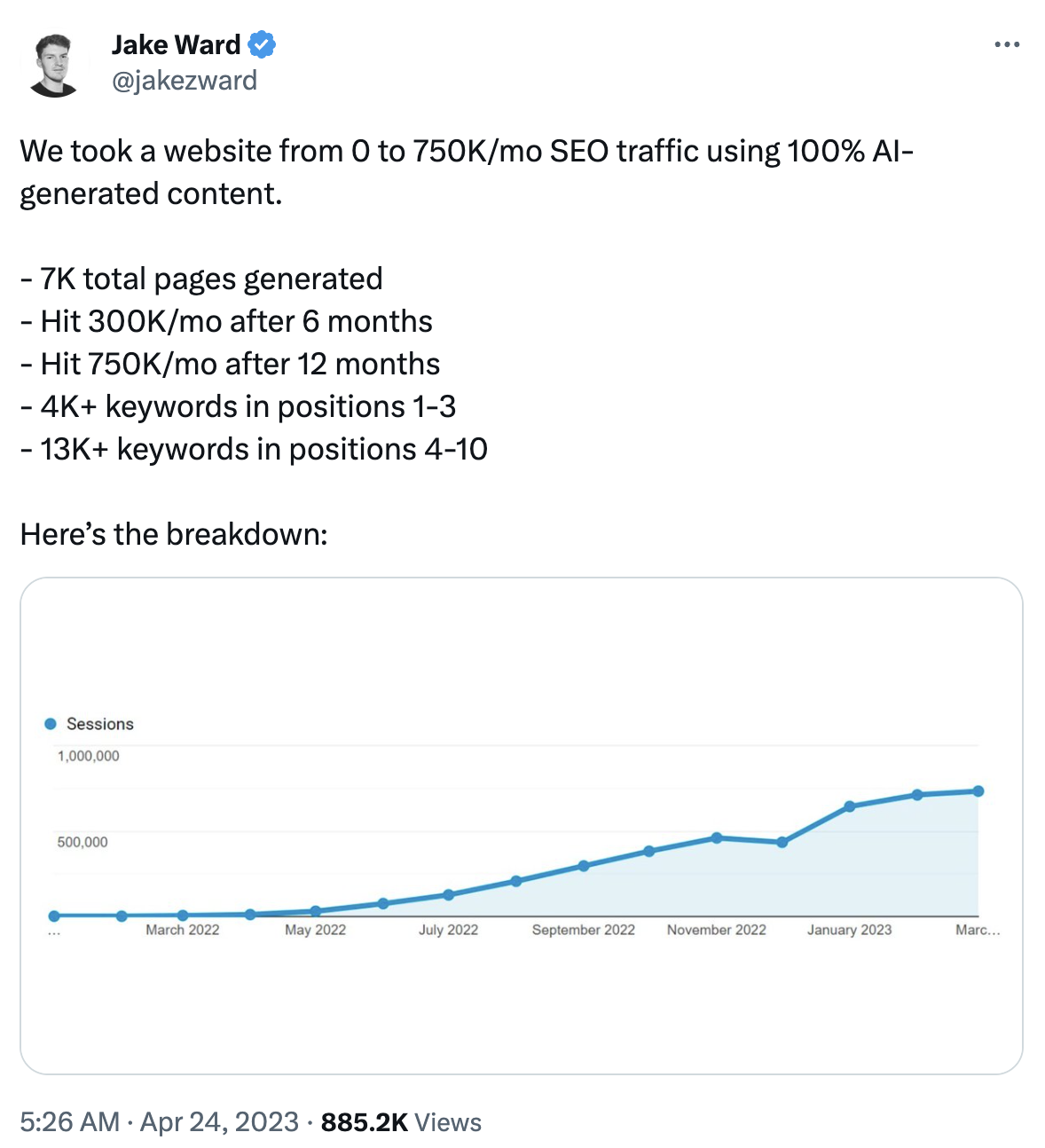
The Content Marketing Strategy
Keyword research remains the cornerstone of any successful SEO strategy. Jake targeted hundreds of potential keywords, focusing on those that would bring the most value.
If you want to grow from an SEO standpoint, you have to do your keyword research.
This foundational step ensures that the content created aligns with what the target audience is searching for.
Then, for content creation he used Byword.ai, and he was able to produce thousands of content pieces daily:
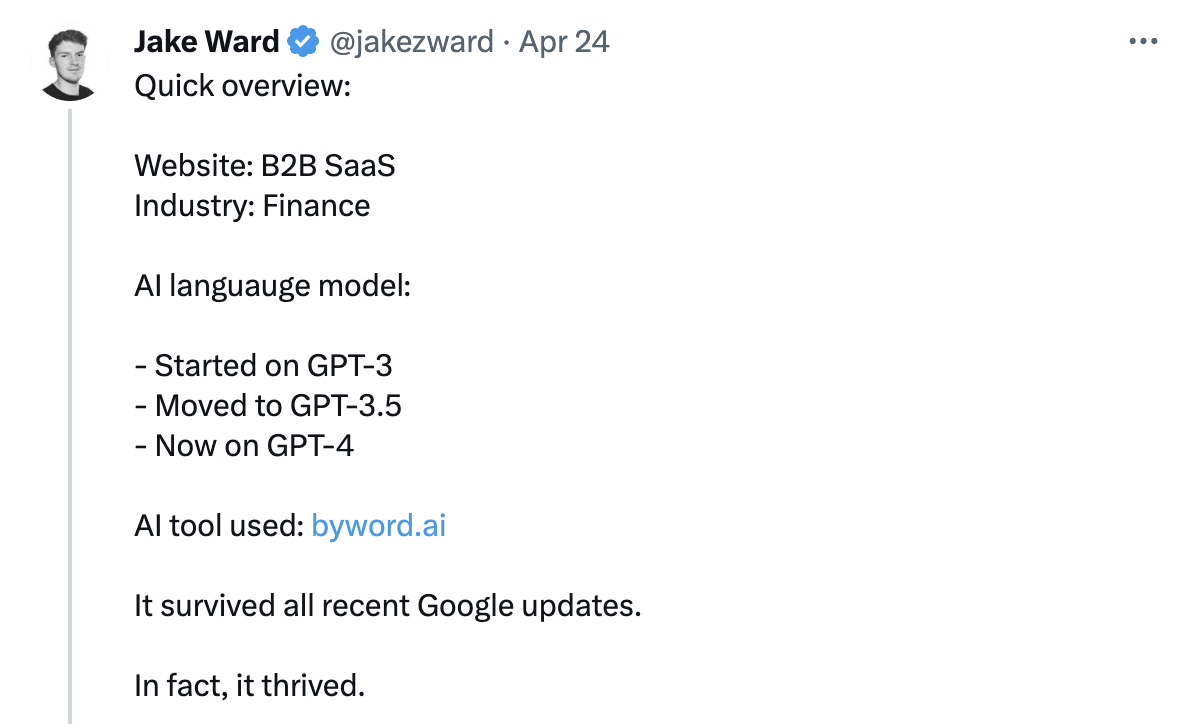
Though he started with GPT-3 and GPT-3.5, he eventually moved on to GPT-4, which is a significant improvement over the previous versions in terms of its size, training data, and capabilities. This very likely helped him get better results, as GPT-4 is able to perform a wider range of tasks than GPT-3.5, including:
- Generating more creative and realistic text formats
- Answering your questions in an informative way, even if they are open ended or challenging
- Following your instructions carefully and completing your requests
- Understanding and responding to emotions expressed in text
This tool, combined with a well-structured website, ensured that search engine spiders could easily crawl and index the content.
The sheer volume of content that Byword.ai can produce is staggering. Thousands of pieces daily, combined with a well-structured website, ensures that search engine spiders can easily crawl and index the content. This kind of volume, when combined with quality, can lead to significant boosts in organic traffic.
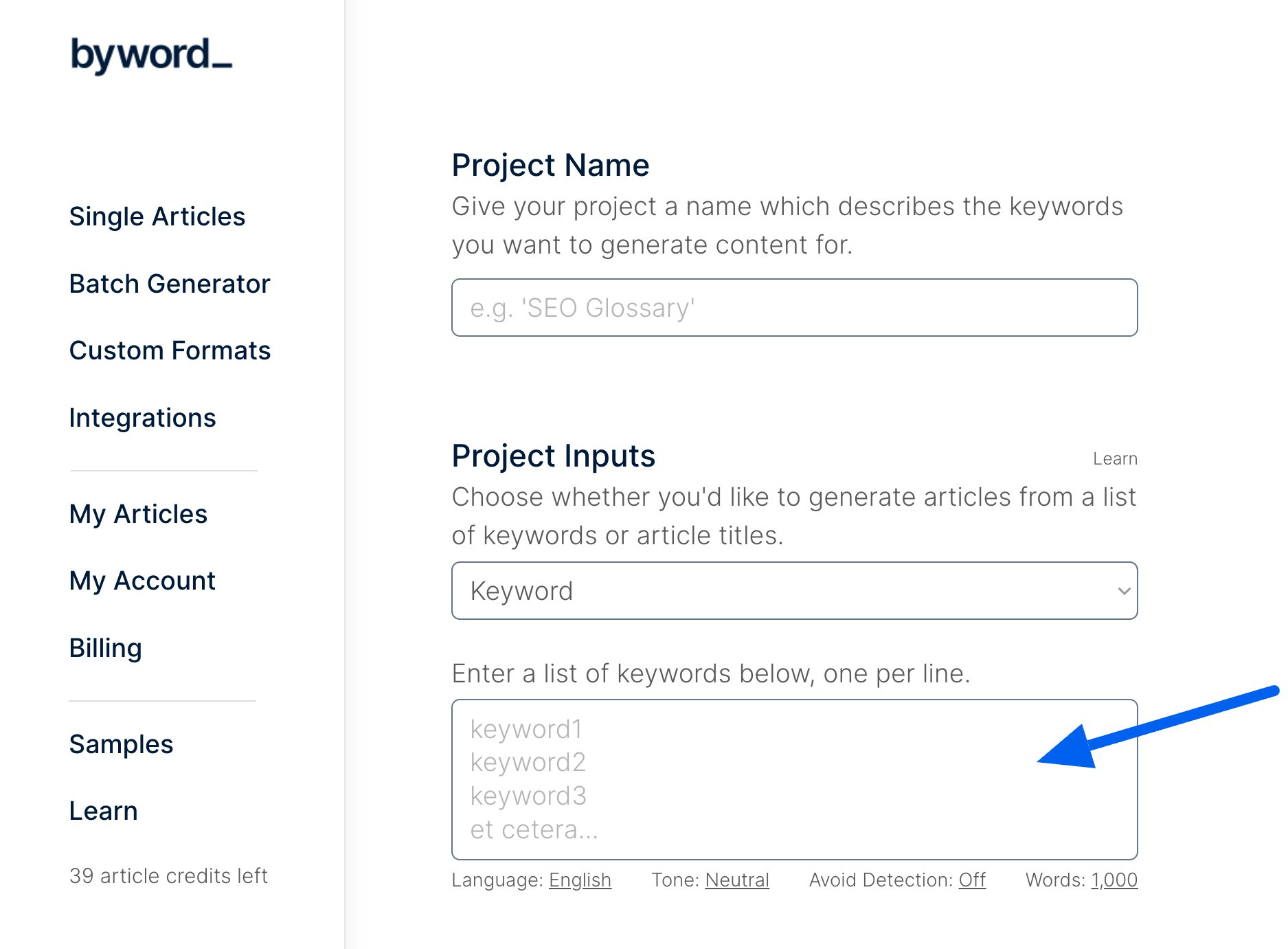
Initially, they published without much editing. However, periodic reviews were conducted, especially for pages that were starting to rank well.
The Funnel Approach
The funnel approach is a tried-and-true method to visualize and understand the customer’s journey.
Jake’s funnel approach, with its blend of AI-generated and human-crafted content, offers a comprehensive strategy for guiding potential customers through their journey.
The three stages of the funnel are:
- Awareness: Scale content production with AI for generic top-funnel topics.
- Consider: Use human writers for personal experiences and emotions, especially for ranking content.
- Convert: Rely on writers to explain nuances and convert readers.
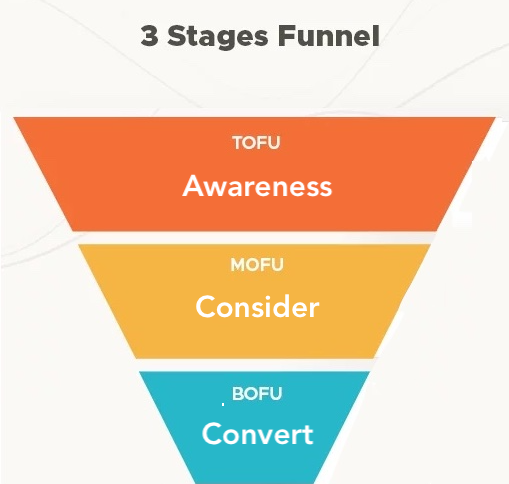
Let’s delve deeper into each of these stages.
Awareness: The Top of the Funnel
At this initial stage, the primary goal is to cast a wide net and capture as much attention as possible. Jake’s approach to scaling content production with AI for generic top-funnel topics is both innovative and strategic:
- Start with AI: At the awareness stage, the sheer volume of content required can be overwhelming. AI tools, like Byword.ai, can produce vast amounts of content quickly, ensuring a consistent online presence.
- Content Type: Generic topics that cater to a broad audience are ideal. These might include introductory articles, overviews and basic guides. The aim is to attract potential customers and introduce them to the brand or product.
Consideration: The Middle of the Funnel
As potential customers move down the funnel, their needs become more specific. This is where personal touchpoints and relatability become crucial:
- Human Writers Take the Lead: At this stage, the content needs to resonate on a personal level. Human writers, with their ability to share personal experiences, evoke emotions and provide in-depth insights, are invaluable. Especially for content that ranks well, the human touch ensures authenticity and trustworthiness.
- Content Type: Detailed articles, case studies, testimonials and comparison pieces are typical at this stage. The aim is to provide potential customers with the information they need to consider the brand or product as a viable option.
Conversion: The Bottom of the Funnel
The final stage of the funnel is all about sealing the deal. Here, the content must not only be persuasive but also clear and informative:
- Human Writers Are Essential: The nuances of conversion content, from addressing specific concerns to providing clear calls to action to editing for brand voice and grammar, require a human touch. Writers can craft content that speaks directly to the reader’s needs, ensuring clarity and encouraging action.
- Content Type: Product or service deep-dives, FAQs, detailed guides and persuasive articles are key. The aim is to provide all the necessary information and assurances a potential customer needs to make a purchase or commitment.
The Importance of White Hat SEO
While the results from AI-generated content are impressive, I still have to emphasize the importance of white hat SEO strategies:

These strategies, which focus on user experience and content quality, are more sustainable in the long run. And with Google’s algorithm getting smarter and smarter, white hat SEO is more important than ever.
It’s much better to go for the long-term white hat strategies that will stand the test of time.
The five pillars of white hat SEO are:
- Keyword research
- Indexing and site architecture (including XML sitemaps)
- On-site trust factors (including E-E-A-T factors and trust badges)
- On-page SEO (including meta title and description, URL structure, headlines, image SEO)
- Link building (including guest posting and expert roundups)
Does Google Penalize AI-Generated Content?
A common concern is whether Google will penalize AI-generated content. The answer?
Google does not automatically penalize AI-generated content. However, just like human-written content, if the article is low-quality, spammy or irrelevant, it may be penalized. Google’s algorithms are designed to reward high-quality content that is useful and informative to users.
Here are some examples of what will get you penalized by Google:
- Content that is copied from other sources without attribution.
- Content that contains keyword stuffing or spinning.
- Content that is irrelevant to the user’s search intent.
- Content that is spammy or misleading.
- Content that is not original or creative.
AI-generated content can be high-quality, but it is important to make sure that it is not simply copied from other sources or generated using techniques that result in low-quality content.
Follow these tips for creating high-quality AI-generated content that will not be penalized by Google:
- Make sure the content is original and not copied from other sources.
- Use AI tools to generate content that is relevant to the user’s search intent.
- Make sure the content is well-written and free of errors.
- Edit and proofread the content before publishing it.
- Be transparent about the use of AI in the content.
If you are unsure whether your AI-generated content will get flagged or not, I suggest using an AI-detector tool like GPTZero or Content at Scale:
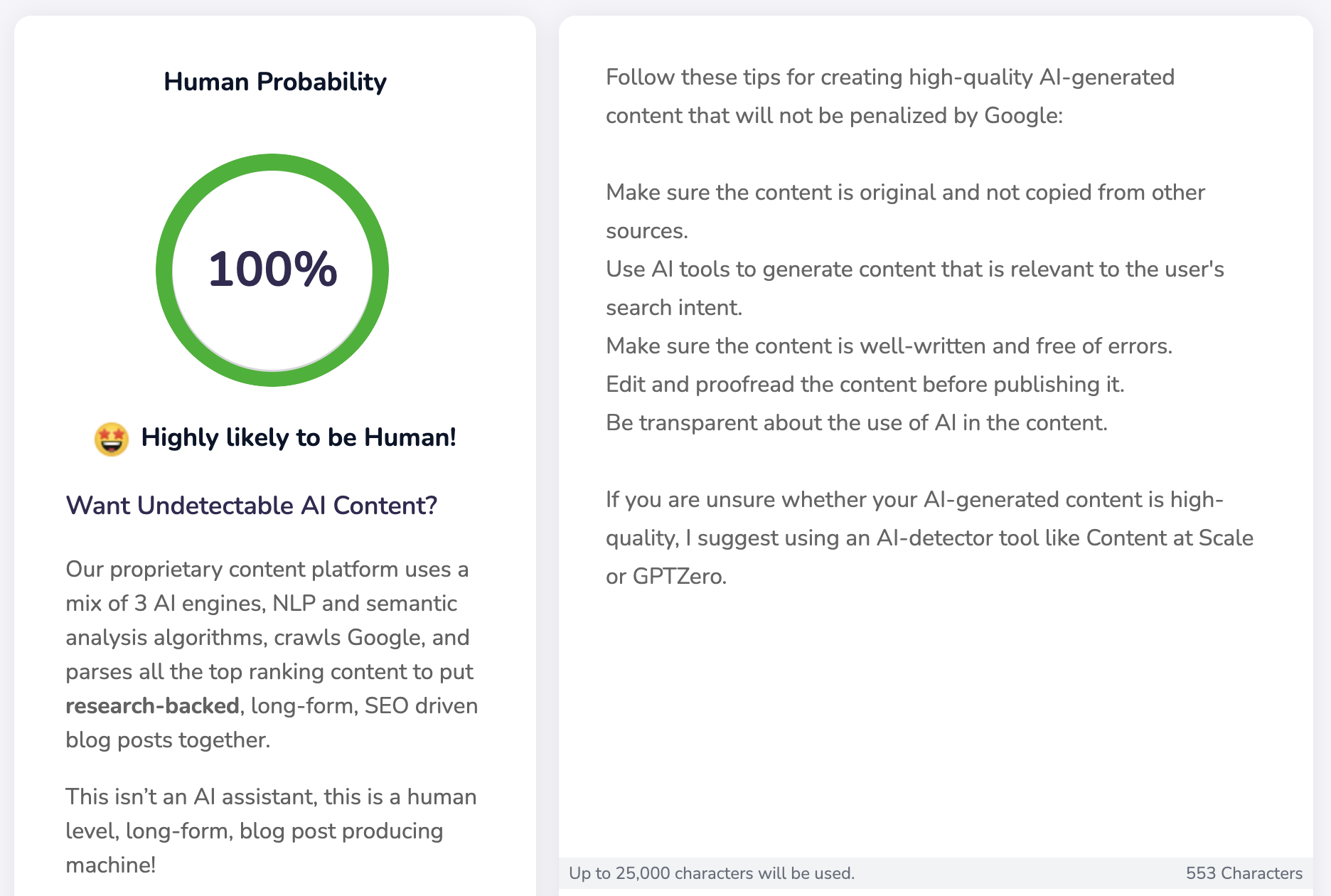
Will AI Replace Human Content Writers?
The rise of AI-generated content begs the question: Will AI replace content writers?
While Jake’s strategy heavily used AI, they still invested in human writers, especially for nuanced, lower-funnel content. The general consensus is that while AI can generate vast amounts of top-funnel content, the human touch is essential for fact-checking, adding rich media, and enhancing the overall content experience.
You can use AI writers, but it’s still very helpful to have humans serve as the Last Mile.
So, no, AI will not replace human content writers anytime soon. Human writers will still be needed to create high-quality content that is relevant and engaging to audiences. However, it is likely to change the way content is written and produced.
Here’s how to get the best use out of AI in content writing:
- Content generation: AI can be used to generate text, translate languages, and write different kinds of creative content. This can free up human writers to focus on other tasks, such as editing and proofreading.
- Content research: AI can be used to research topics and gather information. This can help human writers to write more accurate and informative content.
- Content optimization: AI can be used to optimize content for search engines. This can help improve the visibility of content and attract more readers.
- Content analysis: AI can be used to analyze content and identify trends. This can help human writers understand what content is resonating with audiences and make informed decisions about future content.
Last Word on AI-Generated Content
The case study, while impressive, raised eyebrows when it was discovered that Jake might be one of the co-founders of Byword.ai. This lack of disclosure brought about skepticism regarding the authenticity of the results and the potential bias in promoting Byword.ai.
That’s why transparency in such studies is super important.
Overall, AI-generated content offers promising results in boosting website traffic. But it’s essential to approach it with a balanced perspective and understand its strengths and limitations. As the digital landscape evolves, the synergy between AI and human touch will definitely shape the future of content marketing.
If you’re ready to level up your content with AI tools, Single Grain’s AI experts can help!👇
Repurposed from our Leveling Up podcast.


